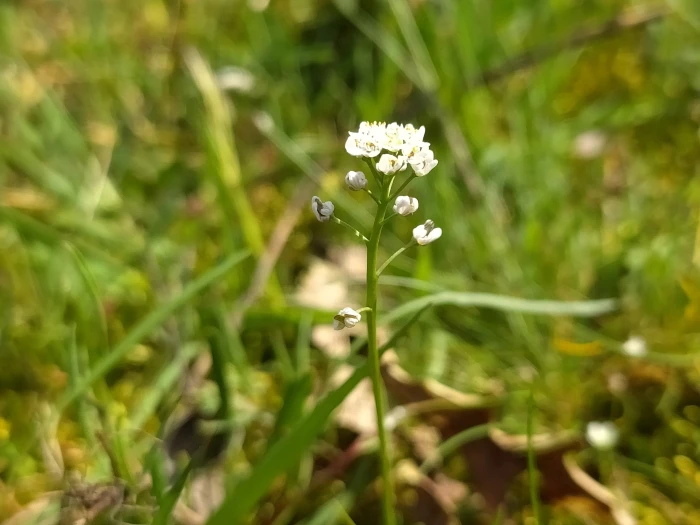Shepherd’s Cress
/
(Teesdalia nudicaulis)
Shepherd’s Cress (Teesdalia nudicaulis)
/

© arthur_haendler
CC BY 4.0
Image By:
© arthur_haendler
Recorded By:
Copyright:
CC BY 4.0
Copyright Notice:
Photo by: © arthur_haendler | License Type: CC BY 4.0 | License URL: http://creativecommons.org/licenses/by/4.0/ | Uploader: arthur_haendler | Publisher: iNaturalist |
























Summary
Teesdalia nudicaulis, commonly known as Shepherd’s Cress, is a perennial herb that is native to a variety of habitats in Europe and parts of North Africa, including grasslands, open woodlands, and rocky outcrops. It is a low-growing plant that typically reaches only 5-15 cm in height, with a rosette of basal leaves and small, white flowers that bloom from April to June. The flowers are not particularly showy, but they do attract pollinators such as bees. Shepherd’s Cress is valued for its early spring blossoms and its ability to thrive in poor, gravelly soils.
Shepherd’s Cress is often used in rock gardens, as ground cover, and in wildflower meadows where its unassuming appearance can complement more showy species. It prefers full sun to partial shade and requires well-drained soil. It is drought-tolerant once established, making it a low-maintenance option for gardeners. While it is not commonly afflicted by diseases or pests, it can become invasive outside of its native range due to its prolific seed production. Gardeners should be cautious about planting it in areas where it may spread uncontrollably.CC BY-SA 4.0
Shepherd’s Cress is often used in rock gardens, as ground cover, and in wildflower meadows where its unassuming appearance can complement more showy species. It prefers full sun to partial shade and requires well-drained soil. It is drought-tolerant once established, making it a low-maintenance option for gardeners. While it is not commonly afflicted by diseases or pests, it can become invasive outside of its native range due to its prolific seed production. Gardeners should be cautious about planting it in areas where it may spread uncontrollably.CC BY-SA 4.0
Plant Description
- Plant Type: Herb
- Height: 0.1-0.5 feet
- Width: 0.5-1 feet
- Growth Rate: Rapid
- Flower Color: Cream, White
- Flowering Season: Spring, Summer
- Leaf Retention:
Growth Requirements
- Sun: Full Sun, Part Shade
- Drainage: Medium, Fast
Common Uses
Erosion Control, Low Maintenance
Natural Habitat
A variety of habitats in Europe and parts of North Africa, including grasslands, open woodlands, and rocky outcrops
Other Names
Common Names: Shepherd’s Cress, Fiddleneck, Common Shepherd’s-Cress, Bare-Stemmed Teesdalia
Scientific Names: Teesdalia nudicaulis, Capsella nudicaulis, Crucifera teesdalea, Crucifera teesdalia, Folis nudicaulis, Guepinia iberis, Guepinia nudicaulis, Iberis bursifolia, Iberis bursifolia
GBIF Accepted Name: Teesdalia nudicaulis
